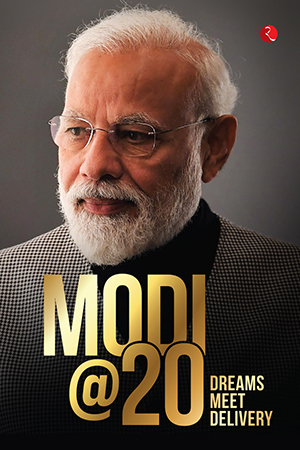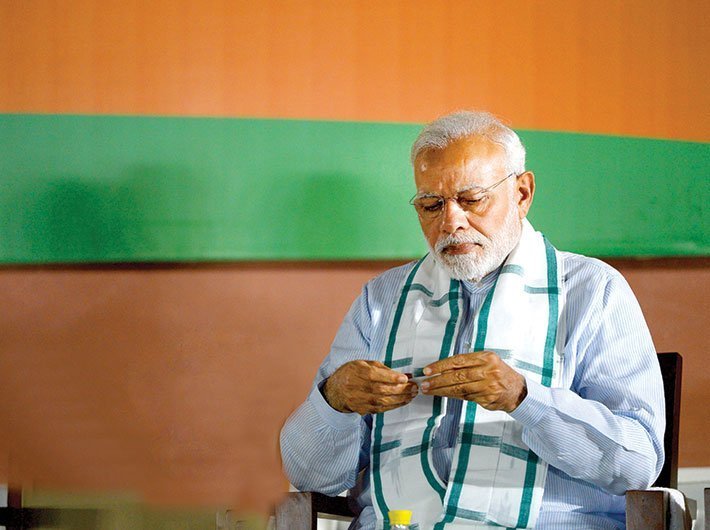 MODI @ 20: DREAMS MEET DELIVERY
MODI @ 20: DREAMS MEET DELIVERY
Edited and Compiled by BlueKraft Digital Foundation
Rupa Publications, 418 pages, Rs 895
PRIVATE ENTERPRISE AND NATION-BUILDING
By UDAY S. KOTAK
Vision and Execution
I have had the privilege of interacting with the Prime Minister over the past twenty years of his governance, first as Chief Minister of Gujarat and later as Prime Minister. His visits to different parts of the world as Chief Minister of Gujarat were marked by a keen desire to adopt best practices and creative ideas for implementation in India. In a meeting that followed his visit to Japan, he narrated several experiences with keen admiration and remarkably detailed observations. He recalled walking on the streets and around stations in Japan, and noticing yellow textured pavers or Braille blocks assisting the visually challenged. On his return, he soon replicated the tactile blocks at Kankaria Lake Front in Ahmedabad.
Something that has also stayed with me regarding the Prime Minister is his phenomenal memory and personal touch. I met him during one of my visits to Ahmedabad, when he was the Chief Minister of Gujarat, along with a colleague of mine, whose family hails from Modi’s home town of Vadnagar. Modi remembered my colleague’s father’s name and narrated specific instances from his early days. Naturally, my colleague was floored.
Similarly, my meetings with him at the Vibrant Gujarat Summits left a deep impression on me. His intense passion to change India for the better and his abiding conviction in India’s private sector as an engine for sustained growth was very encouraging.
In recent times, Modi has been open to bolder ideas for the rapid transformation of India’s economic landscape. His ability to grasp both the big picture and finer details is remarkable.
India’s rapid ascent in the World Bank’s Ease of Doing Business ranking in the last four years is testimony to the efforts of the Modi government to make India an attractive investment destination. India now stands at number 63, up from the 130s during 2013-17. India’s ranking in the Global Innovation Index has improved to 46 in 2021, up from 66 in 2016.
The government’s efforts have encompassed all of India’s private enterprises, from large companies to small units to start-up enterprises and small farms. Its broad-based investment reforms have rekindled the spirit of enterprise among entrepreneurs, big and small, new and old. Its specific programmes, tailor-made for large, medium, small or micro enterprises (as the case may be), will help meet the government’s larger objectives of self-reliance, investment and job creation, while providing sufficient incentives to the private sector to invest. It is a win-win situation for the country and its entrepreneurs.
In his earlier stint as the Chief Minister, Modi had created a favourable environment for entrepreneurs in his home state of Gujarat through his Vibrant Gujarat initiative. The Vibrant Gujarat Summit was launched to make the state a world-class destination for investment by both Indian and foreign companies. Gujarat was the first state to do it; thereafter, most other states have followed suit. Modi demonstrated a great deal of energy and enterprise to showcase his home state to global and domestic companies. I had no doubt that his personal commitment and involvement would lead to large-scale investments in Gujarat and higher growth rates for the state, especially in manufacturing. We now know that the Vibrant Gujarat Summit was a great success, with Gujarat becoming a major manufacturing hub for automobiles, chemicals, petrochemicals, renewable energy, refining and textiles. The manufacturing component of Gujarat GSDP grew 11.3 per cent through the financial years 2003-14, roughly the period of Modi’s tenure as Chief Minister. A similar story is unfolding across the length and breadth of the country under his leadership as Prime Minister, with the unleashing of the intrepid spirits of entrepreneurs. The time for a vibrant India has arrived.
The Modi government’s biggest achievement in the area of investment has been to create a stable business climate through simple, stable and transparent policies and regulations. It has managed India’s economy prudently, implemented major reforms in every factor of production (capital, labour, land and resources), opened up India’s economy to foreign investment and simplified India’s investment approvals and taxation systems. I believe that the framework for the next decade of growth is in place.
Modi has a proven track record on reforms. The conviction and commitment to reforms is visible in the way he has addressed various issues related to ease of doing business that were holding back India’s economic development. In a short span of seven years, his government has implemented path-breaking economic and social reforms. On the economic front, the Modi government has: (1) simplified India’s taxation system for both direct and indirect taxes, (2) implemented PLI schemes to encourage domestic manufacturing and increase self-reliance, (3) simplified India’s labour laws, (4) established a bankruptcy resolution framework and (5) deregulated several sectors to highlight some of the major reforms.
India’s fiscal situation and inflation have been fairly stable and the Indian rupee has depreciated modestly versus other currencies over the past few years. A stable macro-environment is a prerequisite for investment by the private sector. Several emerging countries have gone through periods of very high inflation and even hyperinflation, which renders all plans for investment redundant. India’s fiscal stability and contained inflation over the past seven years was punctuated by high inflation in the second half of the calendar year 2020 due to supply disruptions arising from the COVID-19 pandemic. Otherwise, India has broadly tamed inflation. Average CPI (Consumer Price Index) inflation over the past seven years is 4.8 per cent, significantly lower than 9.8 per cent through the financial years 2009-14. Also, India’s external position has been very healthy at present with foreign exchange reserves of US $633 billion (as of December 2021), external debt-to-GDP at 20.1 per cent (as of September 2021) and foreign currency reserves sufficient to cover fifteen months of imports.
[Excerpt reproduced with the permission of the publishers.]
